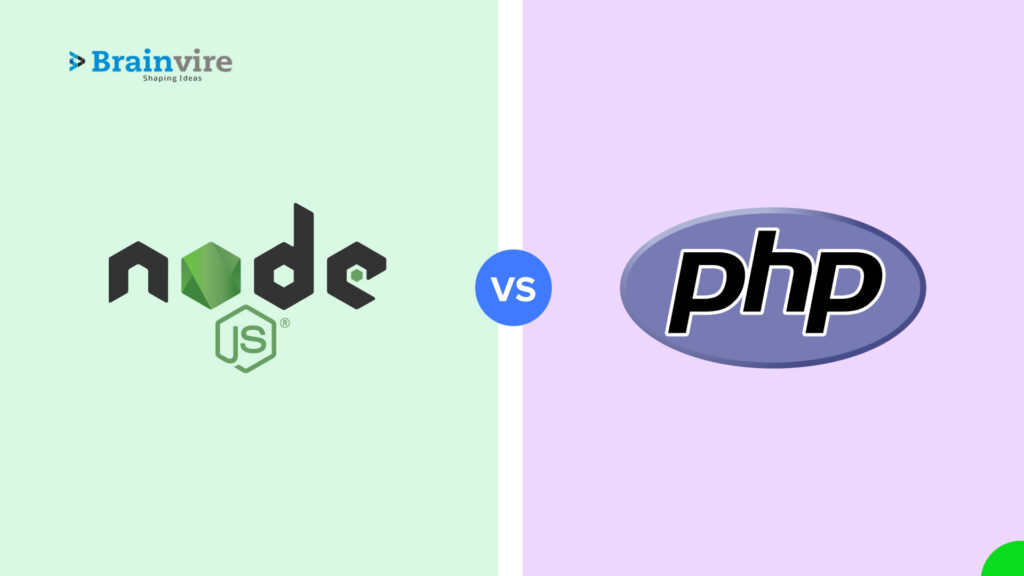Discussing back-end development without mentioning the most prominent technologies, NodeJS and PHP, is almost impossible. Both technologies are rulers of the internet in their own right.
While Node.js rules 1.11% of the internet, we have over 6,738,805+ websites using PHP on the backend. As a result, the development community is constantly debating choosing the best technology for back-end development.
Comparison between Node.js and PHP is an important question during the development phase. This is because both fall under the same category of backend development and have different techniques and similar features.
So, if you’re a business owner, developer, or tech enthusiast, this blog is for you. Continue reading as we save you the trouble of extensive research and contemplation with a deep dive into Node.js and PHP.
Node.js Vs. PHP – An Overview Of The Backend Frameworks
Node.js – The Innovation Of Java Script
The creation of JavaScript in 1995 enabled the need to create more interactive websites, and the technology soon became very popular. While JavaScript had been around for quite some time, it was not until 2009 that the world was introduced to Node.js.
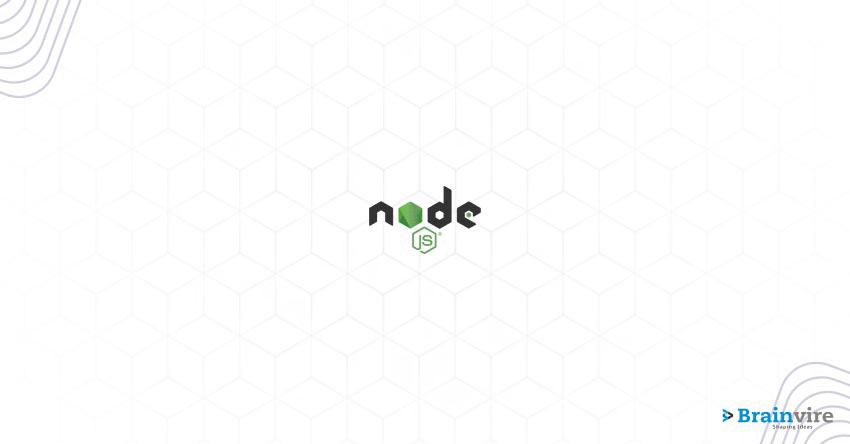
The new backend program enabled developers to use JavaScript on the server side, making creating more efficient and scalable back-end applications easier. Ever since, Node.js has earned itself extensive recognition, with prominent companies such as PayPal, Netflix, and eBay using it.
This popularity was inevitable considering the amazing features Node.js has to offer even today. For instance, familiarity with JavaScript makes it much easier to use Node.js, thanks to the large library ecosystem and simple syntax.
PHP – The New Face Of Web Development
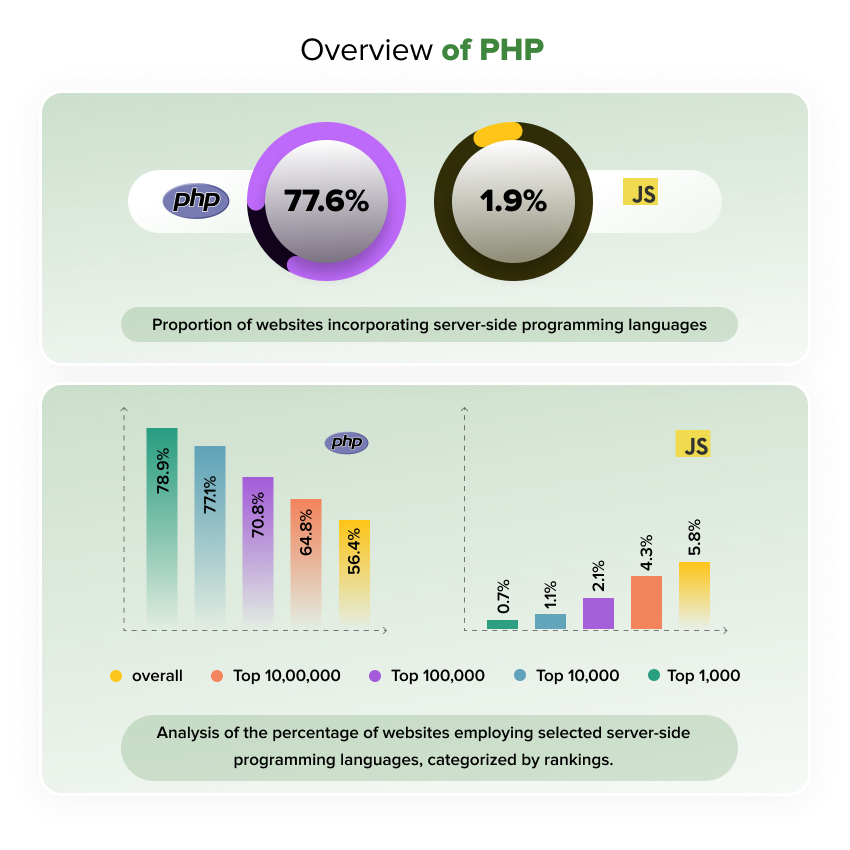
PHP, an initial acronym for “Personal Home Page,” was created in 1993 by Rasmus Lerdorf. This later evolved into a comprehensive programming language with a new name, PHP: Hypertext Preprocessor.”
Initially, most developers were using PHP for server-side programming, but soon, PHP combined with other technologies such as MySQL, Linux, PHP (LAMP) stack, and Apache.
The programming language is elementary, and beginner developers can use it to enhance their skills. You can even access all resources of PHP online to resolve all your queries in no time.
The multi-threaded blocking architecture of PHP processes each request at a time. Lastly, if you plan on building any secure or strict application, PHP is the ideal choice.
Node.js Vs. PHP – Competition Between The Powerhouses
Node.js – The V8 Java Script
Node.js is built on top of the mighty V8 JavaScript engine, meaning you never need to worry about building high-performance applications. Once your app succeeds, Node.js gives you all the room and resources to drive better scalability.
You can use the latest features of the programming language to create highly performant and scalable applications. As a result, many prominent companies such as NASA, Walmart, Paypal,. eBay, GoDaddy, Trello, Twitter, Uber, and more successfully use Node.js for all their requirements.
Interestingly, however, that’s not all! There are other unique perks of Node.js like:
- Community Support: Extensive community support is another great thing about using Node.js, making resolving complications easier. You can even access the thorough online Node.js documentation with multiple guides with information on best practices, modules, examples, syntax, and use cases.
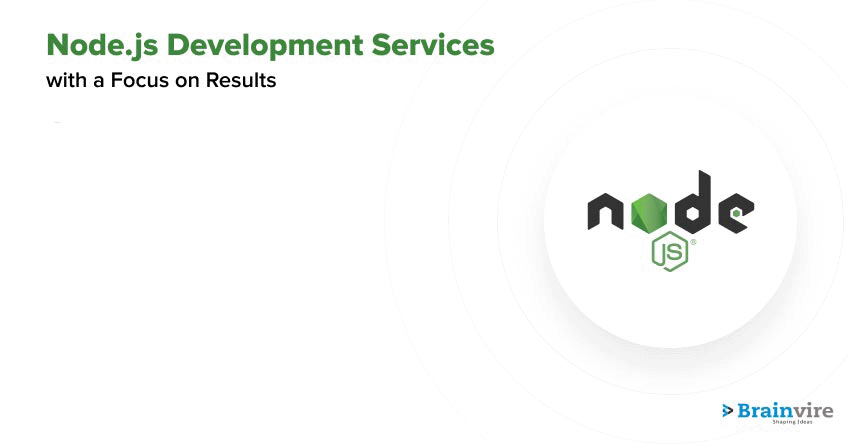
- Access To Numerous Requests: Once signed up, you need not worry about bottlenecks with Node.js since it uses a single-threaded, non-blocking architecture to handle numerous requests simultaneously.
- Extensive Library: Node.js’s extensive library and framework ecosystem are ideal for building real-time applications for Node.js requirements.
Thanks to these amazing features and functionalities, you can use Node.js for several application types. Since the programming language comes well equipped with built-in support for WebSockets, it is the ideal choice for building real-time applications such as chat apps, collaborative tools, or even multiplayer games.
PHP – The Potent CMS
PHP is one of the most popular programming languages for Content Management Systems or CMS. Multiple popular CMS platforms, such as WordPress and Drupal, are built on PHP.
PHP is the ideal choice if you want to integrate any CMS solution into your website. You can even use PHP to customize or integrate the CMS in a manner that meets all your project’s requirements to get the best results.
Here are some other unique aspects of using PHP:
- Extensive Popularity: More than 70% of websites are built using PHP. Considering the amazing advantages of using PHP for web development, this does not come as a surprise.
- Support For Several Platforms: Since PHP is an older technology, it supports many platforms and environments, making it the ideal choice for effective development. You can easily integrate legacy systems and maintain seamless compatibility with older PHP frameworks or codes. Effective custom PHP development can increase the chances of your web development goals becoming real.
- Super Scripting Language: PHP is a scripting language, which means it is not optimized for a specific system, making it a time-consuming mechanism to parse every PHP file. But parser caching can help save that time, enabling you to focus on other value-driven tasks.
Given all that PHP has to offer, it is not surprising that there are numerous popular PHP-based frameworks. Some popular frameworks include Phalcon, Laravel, CakePHP, Slim Framework, Symfony, CodeIgniter, and many more. This makes it apparent why you should hire a dedicated PHP developer as soon as possible for your next project.
Node.js Vs. PHP: Battle Between Performance and Scalability
Both Node.js and PHP are excellent in terms of performance and scalability. They are both unique, with a few differences in approach and operation. Understanding the significance of this metric is essential to ensure you get favorable results with your project.
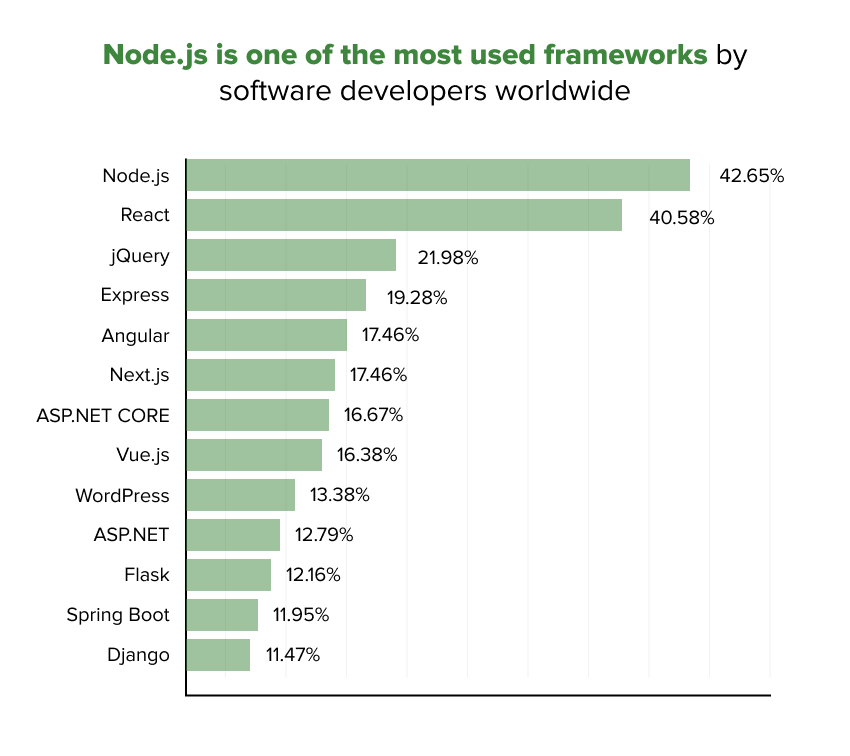
The overall performance of your preferred programming language can impact your project’s page loading speed and navigability. Let’s look at the individual power and performance these backend platforms offer.
Power and Scalability Of Node.js
Node.js is one of the most performant programming languages available almost anywhere. Since it leverages a non-blocking IO, this makes Node.js more efficient and lightweight, which helps facilitate a high-speed execution rate. But you will still need to use at least three programming wizards like Parallelism, Async, and Concurrency to get the best results with Node.js.
Performance & Scalability Highlights Of Node.js
- Asynchronous Event-Driven Architecture
The famous asynchronous event-driven architecture of the Node.js framework helps you process multiple actions simultaneously while running the application. This helps enhance your development process’s efficiency and feasibility, which allows the server to respond to previous API requests more effectively.
- Benchmarking Abilities
Node.js has also earned quite a reputation for its benchmarking abilities. You can leverage its benchmarking abilities to measure how a specific alteration can influence your application’s performance. You can use Node.js to set up automated benchmarks and speed tests to understand your application’s performance better.
Power and Scalability Of PHP
PHP is a conventional yet effective request-response model helps you create a powerful messaging pattern. This is very helpful for enhancing the overall request-response cycle, enabling servers to provide prompt responses.
Performance & Scalability Highlights Of Node.js
- Access To The LAMP Stock
It is part of the LAMP Stack in terms of technology. To construct and manage a PHP-based project, a developer needs to be well-versed in various technologies, including CSS and HTML. What’s more? The potential of interacting with many technologies increases the learning curve even more with PHP.
- Two Different Caching Mechanisms
PHP is also amazing with its two different caching mechanisms: output caching and parser caching. The output caching is designed to save larger datasets in places where other scripts can read them faster for efficient generation.
Node.js Vs. PHP: Development Community and Ecosystem
The development community and the ecosystem play a pivotal role in enriching any open-source platform. Both Node.js and PHP developers must be able to access seamless support whenever faced with any complications.
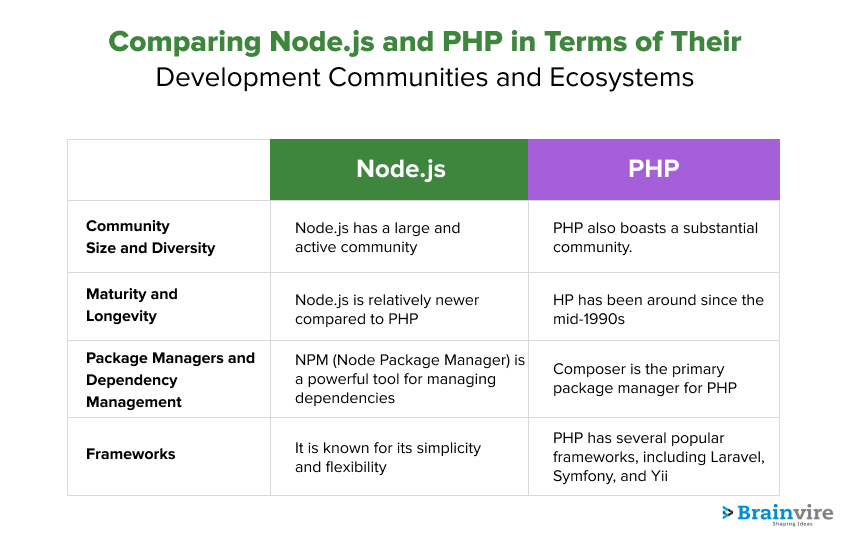
This is where the community and ecosystem come into the picture to make frameworks, libraries, and other resources more accessible for everyone.
Node.JS – The Development Community & Ecosystem
Node.js is a very popular open-source platform, so it does not surprise that it also has the support of a significant development community. No matter where you are based, you are mostly just a Google search away from solving any complications with your Node.js project.
You can even use different forums to raise a specific query for a specific issue; someone somewhere will resolve it quickly. Node.js has been a preferable choice for many developers primarily because it is easy to access the latest packages and libraries of Node.js.
What Makes The Node.js Different?
The programming language is evolving regularly, and the latest libraries and packages are always available when needed. You can even leverage Node.js community support to enhance your understanding of some specific package or library.
PHP – The Development Community & Ecosystem
PHP is no less of a competition for Node.js in terms of community support. The most apparent distinction between Node.js and PHP is age, and PHP is much older than Node.js.
This automatically makes PHP more established since it has been around for decades. This has helped create a large and established PHP community that helps keep all PHP developers connected for seamless and accessible support.
What Makes PHP Different?
PHP also offers developers a comprehensive online manual with all the necessary information for almost every PHP project. This helps foster a rich ecosystem where you can access some of the most effective and performant plugins and extensions. You can use these plugins and extensions to add more appealing features to your application, ensuring it stands out.
Node.js Vs. PHP: Learning Curve and Development Speed
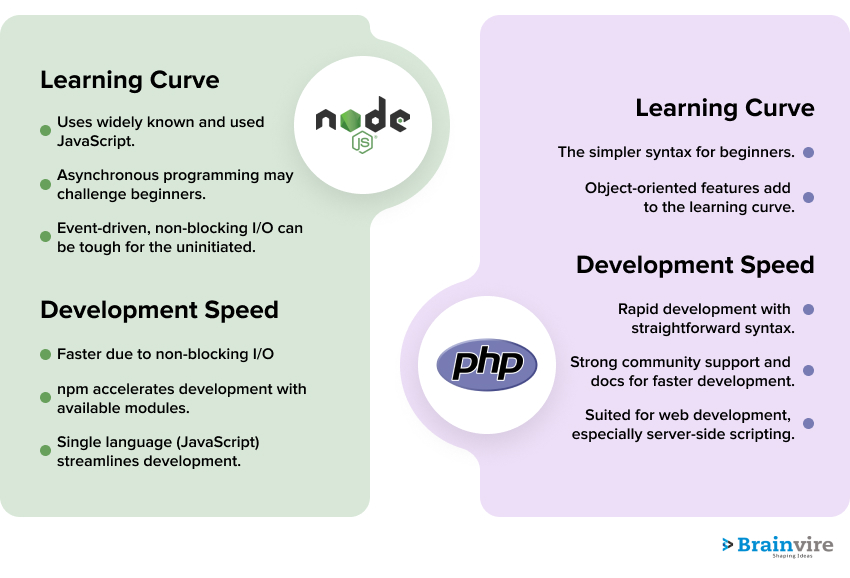
Most Node.js and PHP development companies struggle to hire the right talent in this competitive business environment. One of the primary reasons behind this is that learning and mastering technologies is not always easy, resulting in a talent shortage.
This makes it very important you evaluate the learning curve aspects of both Node.js and PHP before making any final decision. This will help your business hire the right talent and get better results with your project.
Node.js – A Resource Backed Program
Regarding Node.js, there is no shortage of resources and documentation to help you better understand the technology. You can easily access these resources online or offline based on your needs.
Here are some key highlights of the community:
- Node.js also has a robust community where developers share their wisdom with developers in need. This makes it easier to determine your mistakes and take measures to correct them while learning simultaneously.
- With the right resources and documentation, learning Node.js should be easy as long as you are familiar with JavaScript. If you are a beginner in the world of coding, you should start by learning JavaScript first.
This is an important consideration, given that even the basics of JavaScript can help you start building a server in Node.js. Or, you can even consider learning both languages parallelly to get better results while saving valuable time.
PHP – Robust Programming Ecosystem
Then comes PHP, a much older programming language than Node.js, meaning there are more resources and documentation. Here are some key highlights of the community:
- PHP offers developers a comprehensive and detailed manual you can access online. This complete manual has all the necessary information about different PHP examples, syntax, best practices, and functions. You can even leverage this manual to access thorough explanations of how to use PHP tools based on your project’s needs.
- PHP also has an extensive community where you can easily access all support in any case of queries. Most PHP developers for hire would agree that learning PHP is not as challenging as many might expect. But the fact remains that learning something and mastering it are two sides of the same.
While you can easily learn PHP, mastering it might require thorough effort and time. Besides, PHP has also earned a bad reputation for quirks and errors such as return values and inconsistent functions. These quirks can further impact the learning experience of developers.
Node.js Vs. PHP: Choosing the Right Technology for Your Business
Now that you better understand different aspects of Node.js and PHP, it is time to make the actual decision. Choosing the right programming language for your business is very important since it can directly impact how people use and interact with your application.
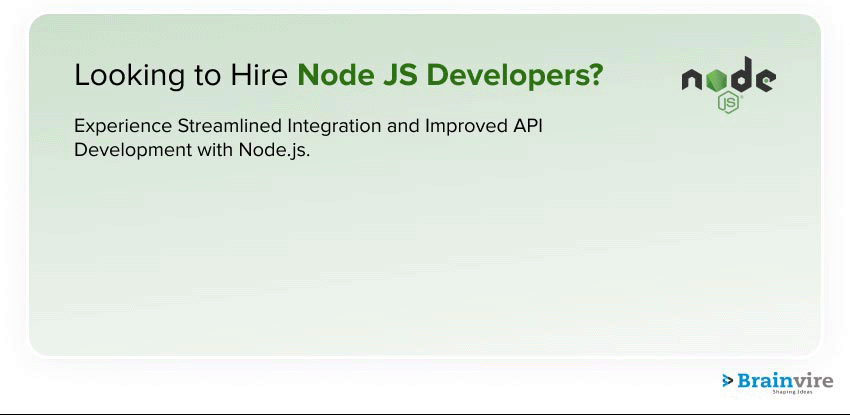
There are also other important considerations, such as your budget and the availability of the right talent in the market. It is important to evaluate all specific factors concerning your business’s needs and requirements to make an informed decision and mitigate the chances of things going wrong.
Your Project Requirements
The first factor you need to think about here is your project’s needs and requirements. You must understand that every project is unique in its own way, and your programming language must enable developers to incorporate that uniqueness into the solution.
You must discuss your project requirements with the development team and seek their opinion. This will help them better conceptualize the right technology that would help meet all your project requirements.
Evaluating The Team Expertise
Evaluating the expertise and competence of your development team is another significant consideration when choosing a programming language. Firstly, you must start by determining if you will need an in-house team or if you will outsource your development teams.
If you choose to go with the in-house team, you must enquire about their skills and understanding of both programming languages. But if you outsource your project development, you must enquire if the vendor’s team has the right skills to suit your project’s requirements and choose the programming language accordingly.
The Budget In Mind
The final and most important factor you need to consider is the budget you have for the project. You must consider different factors that can contribute to the project’s cost, either directly or indirectly. This means evaluating aspects such as the cost of hiring the right talent for the project.
For instance, since there are more PHP developers than Node.js, it is natural for Node.js developers to charge more for their services. This will directly add to the cost of getting the entire project up and running. You must evaluate these factors and see if you have the budget to meet these requirements effectively.
Node.js Vs. PHP – What’s In It For You?
Overall, PHP and Node.js are by far two of the most popular programming languages, and choosing either is not easy. But you can simplify this decision by leveraging an effective decision-making framework to ensure no stone is unturned. You must consider every aspect of the decision, such as the budget, project requirements, the expertise of the development team, and more. You can even take this further by evaluating different implications of either decision and determining which is likelier to ensure project success. This will help you make a more planned and informed decision while avoiding risks as much as possible.
Know Your Backend Programs
There is no specific handbook that will always help you make the right decision in terms of choosing the right programming language for your project. There will always be certain gains and certain losses that you will need to account for.
PHP and Node.js are highly reliable and performant, with an extensive community using these technologies daily. This is where evaluating your project’s needs and requirements becomes so important. Decisions like these are not always about picking the better technology but choosing the one that better meets your project’s needs.
You must evaluate essential aspects such as your project goals, target audience, budgetary constraints, developer proficiency, etc. This will give you more clarity on your needs and availability of resources for making the right decision.
Either way, you must also consider the pros and cons of PHP and Node.js while analyzing them with your project’s requirements. For instance, Node.js can be the right choice if you are developing a real-time application or using front-end technologies such as Angular or React. On the other hand, PHP will be a better choice if you create a CMS-driven blog or eCommerce store. So, make sure you evaluate these aspects and make the right decision.
You may also like to read: Enhancing the PHP Development Experience with PhpStorm 2023.2
FAQs
Node.js and PHP are both programming languages for back-end application development. These programming languages have their unique strengths and drawbacks, making it evaluate all that before choosing either one for your development project.
Both Node.js and PHP come with an ample of features and tools for building web applications. But which programming language is better for your project will depend on the specific needs and requirements of your project.
Node.js comes with the V8 engine and asynchronous execution abilities that help it deliver real-time server interaction, making it relatively faster than PHP. This is also the reason why most developers are choosing Node.js for their development needs.
Node.js and PHP are very popular, and many developers from around the globe use these technologies for back-end development. As a result, both these languages have extensive communities with easily accessible libraries and resources.
Node.js and PHP have their upsides and downsides in terms of using them for building APIs. However, most developers still prefer using Node.js for building APIs since it is ideal for creating real-time applications.
In terms of security, both Node.js and PHP check all the boxes. Both technologies come with certain vulnerabilities, but you can easily address them with the right approach towards development. Besides that, leveraging the best development practices can also go a long way in enhancing security.
Node.js and PHP are two of the most popular development technologies, and most global hosting providers support these technologies. Even deployment is a piece of work with either Node.js or PHP.
Related Articles
-
Develop Efficient Node.js Applications Based On Microservices
Due to high-end features, Node.js is gaining remarkable popularity in this rapidly evolving app development industry. It has enabled top-line companies to craft highly scalable and flexible mobile applications. While
-
Selecting The Ideal PHP Web Development Partner For Your Start up
The world of web development is amazing! It’s one such area where you regularly witness the rise of new, innovative development languages. Interestingly, however, there are a few things that
-
What’s New in PHP 8.3 – Key Highlights and Features
PHP has long held a reputation for evolving constantly and meeting all market demands effectively. As one of the world’s most prominent web development languages, PHP is now ready to

